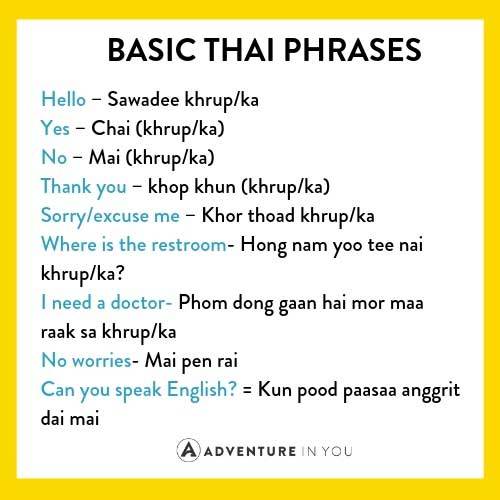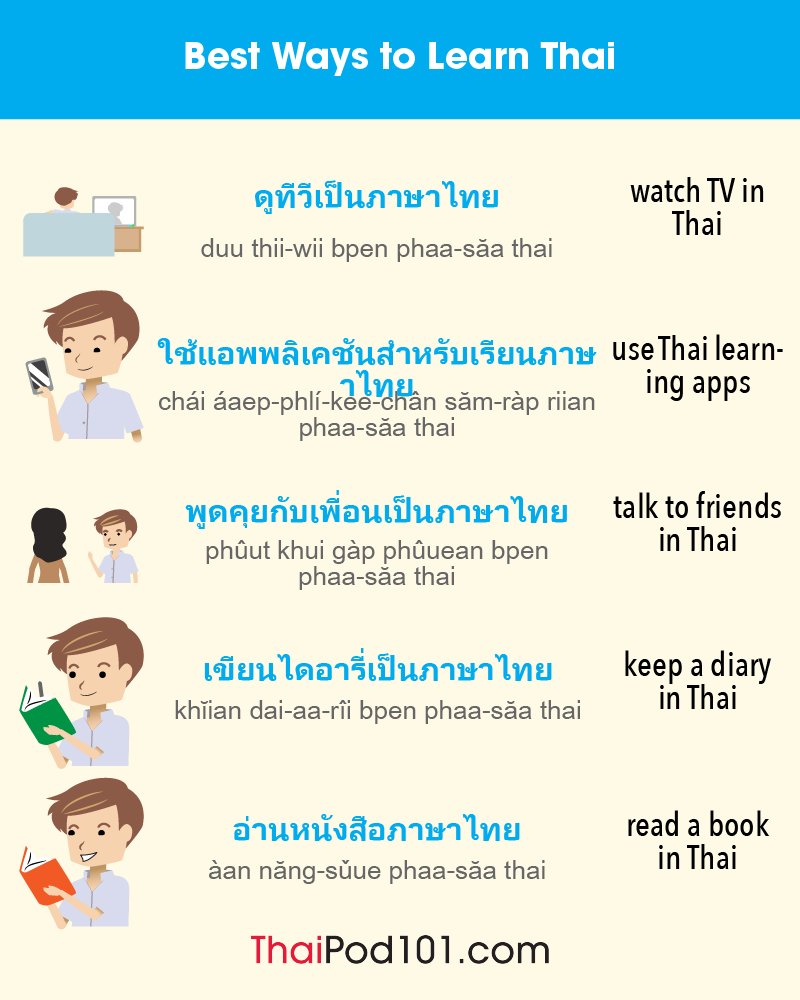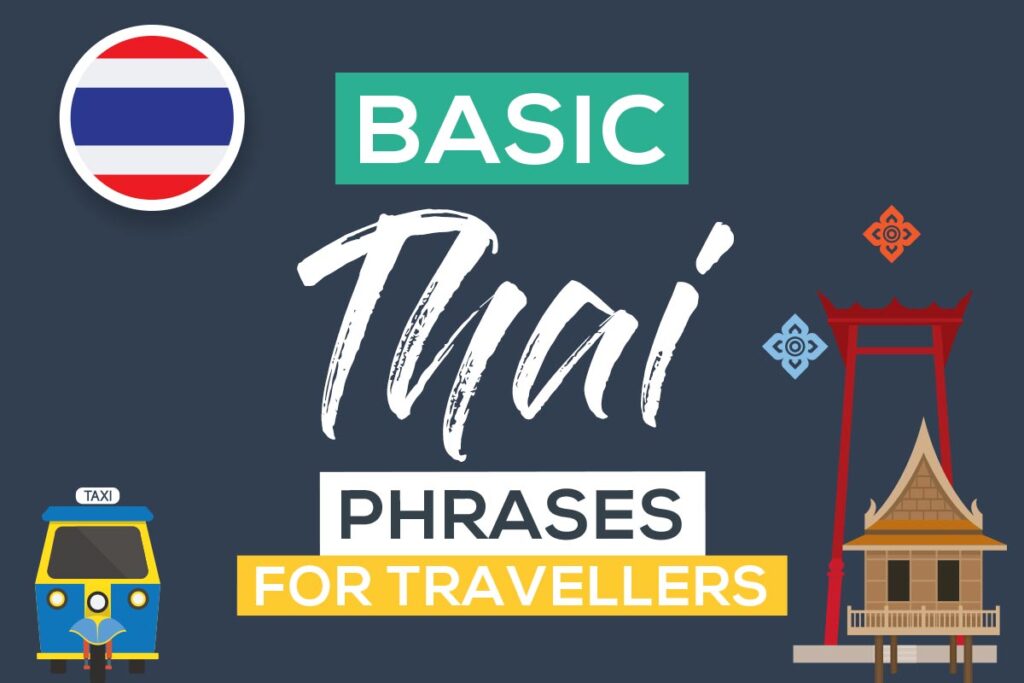Have you ever wanted to learn a new language? Maybe you have a dream of traveling to Thailand and immersing yourself in the culture. Well, I’ve got some good news for you! Today, we’re going to be talking about the fascinating Thai language and how you can start mastering some basic phrases. So, if you’re ready to embark on this linguistic journey with me, keep on reading.
Thai is a beautifully complex language that is spoken by over 20 million people. It’s known for its tonal system, where the pitch of your voice can change the meaning of a word. For example, the word “maa” can mean “come” or “horse” depending on the tone you use. Isn’t that fascinating? In this article, we’ll be exploring some common phrases that will come in handy during your travels in Thailand. From greetings to numbers to essential phrases, you’ll learn how to navigate your way in this rich and vibrant language.
Learning a few basic phrases will not only help you to communicate with the locals but will also show that you have taken the time and effort to understand their culture. It’s always a great idea to learn a few pleasantries like “hello” and “thank you” as it creates a positive impression. Imagine the satisfaction and joy you’ll feel when you’re able to order your favorite Thai dish in the local language, or when you can ask for directions to a famous tourist spot without any hesitation. So, buckle up and get ready to expand your linguistic horizons. In the next section of this article, we’ll dive deep into these basic phrases, giving you the tools you need to confidently navigate your way through the streets of Thailand.

Introduction to the Thai Language
Welcome to the fascinating world of the Thai language! As a traveler, learning a few basic Thai phrases can greatly enhance your experience and help you navigate through this beautiful country with ease. Thailand, known as the “Land of Smiles,” is renowned for its warm and friendly people, and knowing a little bit of their language will open doors to deeper cultural understanding and meaningful connections. In this article, you will discover the importance of learning Thai, the unique characteristics of the language, the challenges faced by foreign learners, and essential phrases for various situations.
The Importance of Learning Thai for Travelers
Learning the Thai language is not only practical but also essential for travelers. While English is widely spoken in tourist areas, venturing off the beaten path may require some basic Thai communication skills. A simple greeting or a phrase of gratitude can go a long way in creating a positive interaction with locals. Moreover, speaking Thai shows respect for the culture and demonstrates your genuine interest in understanding the local way of life. By putting in the effort to learn the language, you will be rewarded with unforgettable experiences and the chance to connect with Thai people on a deeper level.
Unique Characteristics of the Thai Language
Thai, classified as a tonal language, is a language that relies heavily on pronunciation and pitch to convey different meanings. There are five tones in Thai, namely high, mid, low, rising, and falling. The tones are crucial in distinguishing words that may otherwise sound similar. Additionally, Thai uses its own script, which is a combination of consonants and vowels. While the script may seem intimidating at first, with time and practice, you will find it easier to decipher and even read basic Thai signs.
Challenges Faced by Foreign Learners
As with any language, learning Thai comes with its fair share of challenges. The tonal nature of the language can pose difficulties for non-native speakers, as a misplaced tone can completely change the meaning of a word. Additionally, the Thai script may appear complex to those unfamiliar with it. However, with patience, dedication, and a willingness to make mistakes, you can overcome these challenges and make significant progress in speaking and understanding Thai.
Essential Thai Phrases for Travelers
To help you get started on your Thai language journey, let’s explore some essential phrases that will come in handy during your travels.
Greetings and Basic Communication
One of the first things you should learn when visiting Thailand is how to greet people. The traditional Thai greeting is a gesture called the ‘Wai’, where you press your palms together in front of your chest and slightly bow your head. It is customary to greet someone with a ‘Sawatdee’ (hello) followed by ‘Kha’ for females or ‘Krap’ for males, which are polite particles used to show respect. A simple ‘Khop khun’ (thank you) and ‘Mai pen rai’ (you’re welcome) will also go a long way in showing your appreciation and politeness.
Asking for Directions and Transportation
Navigating through a new city can be overwhelming, but with a few basic phrases, you can easily find your way around. To ask for directions, you can use phrases like ‘Hong nam yoo tee nai?’ (Where is the restroom?) or ‘Yoo tee nai?’ (Where is…?). When it comes to transportation, knowing how to ask for a taxi or a ride is essential. ‘Rod taxi’ is commonly used to hail a taxi, while ‘Rod bus’ is used for catching a bus. Additionally, learning numbers from one to ten will help you communicate destinations and negotiate prices with ease.
Ordering Food and Drinks
Thailand is renowned for its delicious street food and flavorful cuisine. To make the most of your culinary adventures, learn some phrases that will help you order food and drinks. ‘Aroi mak’ (it tastes delicious) is a handy expression to show your appreciation for the food. When you want to order a specific dish, simply say ‘Khorng rot’ followed by the name of the dish. To request spicy or non-spicy, use ‘Ped’ for spicy and ‘Mai ped’ for non-spicy. Don’t forget to add ‘Kop khun’ (thank you) to express your gratitude to the server.
Shopping and Bargaining
Shopping in Thailand is an experience like no other, and knowing a few phrases will help you navigate the bustling markets and negotiate prices. When entering a shop, a polite ‘Sawatdee’ along with a smile will set a friendly tone. ‘Tao rai?’ (How much?) is a useful phrase to inquire about prices. When bargaining, politely suggest a lower price by saying ‘Lot noi dai mai krap/kha?’ (Can you lower the price?). Remember to approach bargaining with a friendly and respectful attitude, as it is part of the Thai shopping culture.
Emergency Situations and Seeking Help
While we hope you never have to use these phrases, it is important to be prepared for unforeseen circumstances. ‘Thamai’ (help) is an emergency phrase that can be used to grab someone’s attention if you find yourself in need of assistance. If you need to contact the police, say ‘Rot sib sip’ (call the police). Familiarize yourself with the nearest hospital by asking ‘Rong phayaban yoo tee nai?’ (Where is the hospital?). Remember, it’s always better to be prepared and know a few emergency phrases, even if you never have to use them.

Politeness and Cultural Etiquette in Thai
As you navigate through Thai culture, it is important to understand and respect the local etiquette. Thai society values politeness and harmonious relationships. Here are a few key aspects to keep in mind:
Understanding the Thai Concept of ‘Wai’
The ‘Wai’ is more than just a greeting; it is a gesture that represents respect, gratitude, and apology. Thais use the ‘Wai’ to greet elders, monks, and people of higher social status. When receiving a ‘Wai,’ it is polite to return the gesture. If you are unsure about when to ‘Wai,’ observe and follow the locals.
Proper Use of Thai Honorifics
Thai honorifics are important markers of social status and respect. ‘Khun’ is a general honorific used to address someone politely. ‘Nong’ is used for younger individuals, while ‘Pi’ is used for older individuals. ‘Ajarn’ is used to address teachers or those with a higher level of knowledge. Proper use of these honorifics can help you navigate various social situations with grace.
Respecting Personal Space and Social Norms
Thais value personal space and tend to avoid physical contact with strangers. It is important to respect this cultural norm by maintaining a respectful distance. Additionally, when visiting temples or sacred sites, dress modestly and respectfully, covering your shoulders and knees. These small gestures of respect will go a long way in showing your appreciation for the local customs and traditions.
Thai Pronunciation and Tone Marks
Mastering Thai pronunciation is a key aspect of understanding and being understood in the language. Here are some tips to help you navigate the different tones and tone marks in Thai.
Differentiating Between High, Mid, and Low Tones
In Thai, the tone in which a word is spoken can completely change its meaning. It is crucial to pay attention to the different tones and practice them consistently. The high tone is characterized by a rising pitch, the mid tone is a level pitch, and the low tone is a falling pitch. Listening to native speakers, practicing with tone drills, and using tone marking resources will greatly improve your pronunciation.
Mastering the 5 Thai Tone Marks
To further complicate matters, Thai also uses tone marks to indicate the tone of a word, which can make a significant difference in meaning. The tone marks include the high tone mark (́), the low tone mark (̀), the falling tone mark (̂), the high rising tone mark (̌), and the mid tone mark ( no tone mark). Knowing how to read and apply these tone marks will greatly enhance your comprehension and help you pronounce words correctly.
Common Pronunciation Mistakes to Avoid
As a foreign learner, it is natural to make pronunciation mistakes. However, being aware of common pitfalls can help you improve your speaking skills. Some common mistakes to avoid include confusing similar sounds, misplacing tones, and not pronouncing final consonants. Regular practice and seeking feedback from native speakers or language teachers can help you identify and correct these mistakes.

Thai Language Learning Resources
To continue your Thai language learning journey, here are some recommended resources and tools that can support your studies:
Recommended Thai Language Textbooks and Websites
There are several textbooks available for learning Thai, such as “Thai for Beginners” by Benjawan Poomsan Becker or “Teach Yourself Thai” by David Smyth. These books provide a structured approach to learning the language and offer explanations of grammar and vocabulary. Additionally, websites like ThaiPod101, Transparent Language, and Learn Thai with Mod offer online lessons, interactive activities, and podcasts to supplement your learning experience.
Useful Mobile Applications for Learning Thai
In the digital age, language learning apps have become popular and convenient. Apps like Memrise, Duolingo, and AnkiDroid provide Thai language courses and interactive flashcards that can be accessed anytime, anywhere. These apps offer gamified learning experiences and can be a useful way to practice vocabulary, grammar, and pronunciation on the go.
Finding Language Exchange Partners or Tutors
One of the most effective ways to improve your Thai speaking skills is through conversation practice with native speakers. Language exchange platforms like Tandem, HelloTalk, and ConversationExchange connect language learners with speakers of the target language. Engaging in language exchange sessions will not only improve your Thai language skills but also provide insights into Thai culture and everyday life.
Cultural Insights through Thai Language
The Thai language is a reflection of the rich cultural heritage and traditions of Thailand. By delving deeper into the language, you will gain valuable insights into Thai culture, expressions, proverbs, and literature.
Understanding Cultural Nuances through Thai Expressions
Thai expressions often reveal cultural nuances and behaviors. For example, the phrase ‘mai pen rai’ not only means ‘you’re welcome’ but also embodies the Thai way of promoting a laid-back and content mindset. Listening to Thai conversations and observing how certain phrases are used will give you a deeper understanding of Thai culture and its emphasis on maintaining harmony and avoiding conflict.
Thai Proverbs and Idioms
Proverbs and idioms are an integral part of Thai language and culture. Exploring these linguistic gems will deepen your understanding of Thai values and attitudes. For instance, the proverb “kaaw mai liao” (time waits for no one) emphasizes the importance of seizing the present moment. Discovering and using these idiomatic expressions will not only impress locals but also give you a unique insight into the Thai mindset.
Exploring Thai Literature and Entertainment
Thai literature and entertainment provide a window into the hearts and minds of the Thai people. Thai novels, films, and music reveal the country’s history, societal issues, and cultural heritage. Thai authors like Prapassorn Phoothong and Prabda Yoon have gained international recognition for their thought-provoking works. Watching Thai movies or listening to Thai music can also help you improve your listening skills and deepen your connection to the language.

Tips and Strategies for Mastering Thai
Learning any language requires time, effort, and dedication. Here are some tips and strategies to help you along your journey to mastering Thai:
Building Vocabulary through Flashcards and Mnemonic Techniques
Vocabulary is the foundation of any language. Create your own flashcards or use online flashcard platforms like Anki or Memrise to practice new words. To retain vocabulary more effectively, use mnemonic techniques, such as creating mental associations or memorable visual images, to link words with their meanings. Consistent daily practice with flashcards will expand your vocabulary and improve your overall language proficiency.
Practicing Speaking with Native Thai Speakers
Immersive speaking practice is invaluable for language learning. Take advantage of language exchange platforms or local language meetup groups to find native Thai speakers interested in practicing English. Engaging in regular conversations with native speakers will help you improve your pronunciation, fluency, and confidence in speaking Thai.
Immersion Experiences and Studying Abroad
Immersing yourself in the Thai language and culture is one of the most effective ways to accelerate your learning. Consider participating in a language immersion program or studying abroad in Thailand. These experiences will provide you with opportunities to interact with native speakers, practice Thai in real-life situations, and immerse yourself in the vibrant culture of Thailand.
Common Mistakes to Avoid
While learning a new language, it is common to make mistakes. Here are some common mistakes to be aware of when learning Thai:
Misusing Thai Honorifics
Using the wrong honorifics or not using them at all can unintentionally convey disrespect or offend someone. Take the time to understand the nuances of Thai honorifics and how they are used in different social situations. Paying attention to how Thai locals address each other can provide valuable insights into proper usage.
Confusing Similar Sounding Words
The Thai language has words that may sound similar to English words but have completely different meanings. For example, ‘khun’ in Thai means ‘you’ and is used as an honorific, while ‘khao’ means ‘rice.’ Be cautious when assuming the meaning of a word based on its sound. Always double-check meanings to avoid confusion and misunderstandings.
Overusing English in Thai Conversations
As an English speaker learning Thai, it can be tempting to rely on English as a fallback option. However, to truly immerse yourself in the language, try to limit the use of English and embrace the opportunity to practice speaking Thai as much as possible. Even if you make mistakes, most locals will appreciate your effort and help you improve.

Overcoming Language Barriers in Thailand
Despite your best efforts, there may still be instances where language barriers pose a challenge. Here are some tips to effectively communicate when faced with limited Thai proficiency:
Tips for Effective Communication when Faced with Limited Thai Proficiency
When encountering a language barrier, remember to remain patient, polite, and resourceful. Use simple language, gestures, and body language to convey your message. Basic phrases like ‘chai’ (yes) and ‘mai chai’ (no) can help you understand and answer simple questions. Additionally, using visual aids, such as maps or pictures, can help you communicate your needs more effectively.
Utilizing Translation Apps and Dictionaries
Translation apps and dictionaries can be valuable companions when facing language barriers. Applications like Google Translate, ThaiDict, or Pleco offer translation services that can help you communicate and understand basic phrases. However, be mindful that translation apps may not always provide accurate translations, so it is helpful to have additional resources on hand.
Seeking Assistance from Local Tourist Information Centers
When all else fails, local tourist information centers are a reliable source of assistance. These centers are staffed with individuals who are accustomed to dealing with language barriers and can provide guidance and support. They can help you with practical information, directions, and even make necessary arrangements on your behalf.
Conclusion
Congratulations on embarking on the journey of learning the fascinating Thai language! Mastering basic Thai phrases will not only enhance your travel experiences but also deepen your understanding and appreciation of Thai culture and its warm-hearted people. Remember to practice regularly, be patient with yourself, and embrace every opportunity to immerse yourself in the beauty and intricacies of the Thai language. With continued practice and immersion, you will find yourself progressing towards fluency and gaining a lifelong connection to the enchanting world of Thai language. Sawadee krap/kha! (Goodbye and good luck!)
